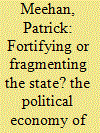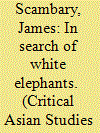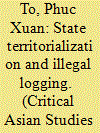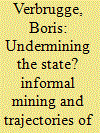|
|
|
Sort Order |
|
|
|
Items / Page
|
|
|
|
|
|
|
| Srl | Item |
| 1 |
ID:
139436


|
|
|
|
|
| Summary/Abstract |
Cambodia has recently demonstrated one of the highest rates of deforestation in the world. While scholars have long explored the drivers of tropical forest loss, the case of Cambodia offers particular insights into the role of the state where transnational governance and regional integration are increasingly the norm. Given the significant role logging rents play in Cambodia's post-conflict state formation, this article explores the contemporary regime and its ongoing codependent relationship with forested land. Insights are distilled from comparative analysis of illicit logging in two ethnographic case studies. Both involve foreign investments by state-owned companies – a Chinese-backed hydropower dam and Vietnamese-owned rubber concessions – and both are nestled in prominent conservation landscapes that are managed with international donor support. Together, the cases reveal how Cambodia's current timber extraction regime works through the use and abuse of legal mechanisms associated with forest conservation and foreign investment projects, and the mobilization of elite alliances that log both for private gain and in service of the ruling party's interests. By implication, the government's remarkable facilitation of transnational projects for conservation and development must be reappraised and ultimately seen as constitutive of a predatory and extractive regime that continues to rely heavily upon illicit logging revenues.
|
|
|
|
|
|
|
|
|
|
|
|
|
|
|
|
| 2 |
ID:
139434


|
|
|
|
|
| Summary/Abstract |
This article develops the idea of “dirty money states” by defining and exploring the problem of illicit state financing in Southeast Asia. Most diagnoses of Southeast Asia's flourishing illicit economies focus on the prevalence of corruption and the “decay” of the state, but the authors of this essay develop a more nuanced explanation by exploring how states cultivate and sustain themselves through illicit extraction. Drawing from emerging literature on states and criminality, as well as fiscal sociology, they develop a novel theoretical framing for the six country case studies that comprise this thematic issue. Each study – on Indonesia, Cambodia, Vietnam, Myanmar, East Timor, and the Philippines – examines empirically how illicit state financing works. Whether revenues derive from gold, timber, opium, aid agencies, or business interests, the authors identify consistent patterns in the nature and behavior of the state vis-à-vis illegally generated funds. These patterns encompass territorial dynamics and practices; the everyday social worlds of state actors and their entrepreneurial allies; and the paradoxical interplay between formal and informal realms. Ultimately the authors argue that illicit monies are fundamental to contemporary state building in the region, extending even to the delivery of public goods and services. These findings are potentially uncomfortable for scholars, governments and development practitioners, particularly because they challenge conventional ideas about how the strength and/or weakness of states might be understood in Southeast Asia. But they demand attention, since they are the product of an ambitious and unconventional research endeavor.
|
|
|
|
|
|
|
|
|
|
|
|
|
|
|
|
| 3 |
ID:
139438


|
|
|
|
|
| Summary/Abstract |
Over the past twenty-five years, the government of Myanmar (Burma) has consolidated control over large parts of Shan State, neutralizing much of the threat posed by armed groups and strengthening its hold over revenue extraction. During this period Myanmar has retained its position as the world's second largest producer of illicit opium, much of which is converted into heroin within the country's borders. This article explores the relationship between state-building processes and the illicit opium/heroin economy in Shan State since 1988. The author has four aims. First, to reassess the theoretical assumptions that equate illicit economies with state fragility and demonstrate instead why illicit drug economies can become embedded in processes of conflict reduction and state consolidation. Second, to explain why establishing control over Shan State has become so important to the Myanmar government's state-building ambitions. Third, to analyze how the state's engagement with the drug trade has become a vital part of its attempts to consolidate control, in terms of financing military expansion and brokering deals with strongmen who are able to govern local populations. Finally, to assess how these strategies embody a form of “negotiated statehood” in which the state's growing control has been defined by attempts to manage, rather than monopolize, the means of coercion and extraction.
|
|
|
|
|
|
|
|
|
|
|
|
|
|
|
|
| 4 |
ID:
139439


|
|
|
|
|
| Summary/Abstract |
A little more than a decade after independence, the small island state of East Timor is exhibiting the hallmarks of a neo-patrimonialist state. Since 2008, utilizing its considerable oil reserves, the government has embarked on a major infrastructure development program. However, despite a complex regulatory regime to safeguard the quality and transparency of spending, these systems have been routinely bypassed by executive-style decision making and a variety of informal and sub-legal devices. Public funds have been channeled to clientelist networks via often controversial infrastructure projects or state employment. This article details the emergence of this state and explains how a command style of government and complex systems of reciprocal obligation embedded in an array of parallel, informal networks have undermined the foundations of a Weberian rational-legal state, with critical consequences for development and stability.
|
|
|
|
|
|
|
|
|
|
|
|
|
|
|
|
| 5 |
ID:
139440


|
|
|
|
|
| Summary/Abstract |
What kinds of states are financed by illicit monies? Does the source of state revenue matter for state formation? This article examines these questions in the context of democratizing Indonesia by analyzing licit and illicit sources of Indonesian police financing and the ways in which illicit practices of extraction and accumulation reshape the structure of the state. Budgetary revenues are both deficient and poorly organized by the Indonesian police (POLRI), continuing practices of fiscal maladministration and rent seeking that defined Suharto's New Order. This article demonstrates how this legacy continues within today's police by illustrating how on- and off-budget financing both resources police work and feeds centralized patron-clientalism through an ethics of “dirty-money” that ultimately sees rents flow upwards to police leadership. However, as Indonesia's neoliberal style democratization fragments centralized patronage into a shifting and unstable patron-clientalism, established patterns of rent accumulation and circulation and the moral-legal regimes that support them break down. In an uncertain environment, officers of all ranks canvass the political system, forming increasingly diverse networks that they hope will secure rents and their political future. Reworking Jean François Bayart's original use of the term, this, the author argues, is “the rhizome state.”
|
|
|
|
|
|
|
|
|
|
|
|
|
|
|
|
| 6 |
ID:
139437


|
|
|
|
|
| Summary/Abstract |
In spite of a government logging ban and wide deployment of forest protection staff, illegal logging persists in Vietnam. This article delves into this apparent paradox, examining the dynamic relationship between state governing practices and illegal logging. Using the lens of “territorialization” and taking a historical view, the author argues that the present logging ban should be understood as one element of a range of state territorial strategies that have been implemented since the beginning of the postcolonial era – strategies that have all aimed to control local people's access to forest resources. The author explains that in the 1950s–1980s, the government officially excluded local people from accessing forest resources, particularly timber; but then, following the doi moi (renovation) in the 1980s, it launched a “regulated inclusion” of local people. In this analysis, I show how state territorialization, including the logging ban, works to create spaces of state control that can then be used to generate informal rents, both materially and discursively, for state actors. These rents in turn bolster the state in myriad ways. However, various discrepancies emerge in the process, for example between state images and practices and between different levels of state administration.
|
|
|
|
|
|
|
|
|
|
|
|
|
|
|
|
| 7 |
ID:
139435


|
|
|
|
|
| Summary/Abstract |
Building on critical perspectives on the state and the informal economy, this article provides an analysis of the “state of the state” on the eastern Mindanao mineral frontier. In the first instance, the author explains that the massive expansion of informal small-scale gold mining, instead of undermining state rule, has given rise to joint institutions of extraction that promote the interests of local politicians and informal miners, amongst others. Relying on the coercive and legitimizing strengths of local state institutions, local politicians have created an environment conducive to the persistence and arguably the further expansion of small-scale gold mining. In the process, they not only beef up their personal authority and the state's fiscal revenues, but also contribute to the consolidation of state rule on the upland frontier. Transcending the local level, this parallel process of small-scale mining expansion and state consolidation, the author argues, can be understood as the result of a long-standing tradition of decentralized state building through local strongmen-politicians. Finally, attention is drawn to the expansion of large-scale mining and how it is highly likely to upset the sociopolitical stability built around joint extraction regimes in the informal small-scale mining economy.
|
|
|
|
|
|
|
|
|
|
|
|
|
|
|
|
|
|
|
|
|